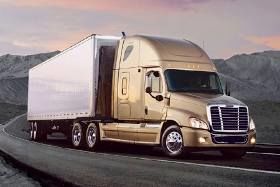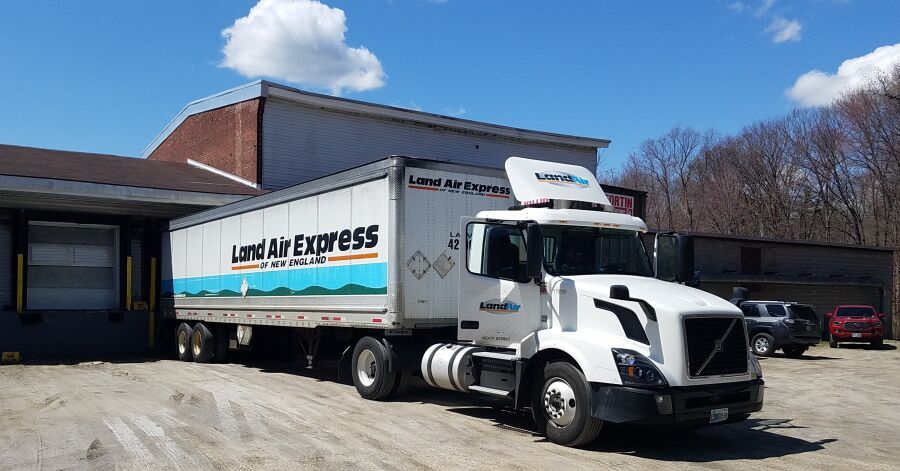Local Driving Is So Good!
Topic 29995 | Page 1
Happy for u Andrey. Best of luck to you.
I started driving for a local LTL company this Monday. So far I am very glad. The biggest difference for me is how there is no need to deal with dock people, always waiting for a door, and then for loading/unloading. I don't know, maybe it is a local New England thing, but 100% of time I drive to the dock, back into any available door, walk in, open my trailer door (yes, it is a roll up door), and then either let someone use their fork lift, or use my pallet jack myself. Stops are therefore about 5-10 minutes each. It does get complicated sometimes to drive through these tiny skinny towns, but why not view it as a free chance to practice? :-) Backing is sometimes tough too, a lot of these warehouses were probably built before first trucks hit local roads... Overall, I like this job much more than my previous regional 5-2.
Regional:
Regional Route
Usually refers to a driver hauling freight within one particular region of the country. You might be in the "Southeast Regional Division" or "Midwest Regional". Regional route drivers often get home on the weekends which is one of the main appeals for this type of route.
LTL:
Less Than Truckload
Refers to carriers that make a lot of smaller pickups and deliveries for multiple customers as opposed to hauling one big load of freight for one customer. This type of hauling is normally done by companies with terminals scattered throughout the country where freight is sorted before being moved on to its destination.
LTL carriers include:
- FedEx Freight
- Con-way
- YRC Freight
- UPS
- Old Dominion
- Estes
- Yellow-Roadway
- ABF Freight
- R+L Carrier
Congrats, Andrey!!!
Super happy for you; glad it all worked out in your favor!!!
Don't be a stranger, man.
~ Anne ~



Yes, in cities especially, there are definitely older dock locations that were not built with 53' trailers in mind. You will no doubt enjoy local driving. Unlike OTR , time management is almost non-existent, really. You only have to manage your break. You have no control over unload time; sometimes consignees are quick, other's may be as slow as molasses straight from the freezer. For me, that usually determines my capacity for earnings for the day. We get assigned a load (or loads if multi-stop) go to stop A, get unloaded, next stop (or back to home base for next load), etc.. I like the fact that with my company, the loaded trailers are ready, we just get our assignment and go. I just get back to home base, get my next trailer and deliver that load or loads and come back. Repeat as many times as possible in my 14 hour window. Again, the only negative I see is dependent on how quickly the consignee unloads the trailer.
Consignee:
The customer the freight is being delivered to. Also referred to as "the receiver". The shipper is the customer that is shipping the goods, the consignee is the customer receiving the goods.
OTR:
Over The Road
OTR driving normally means you'll be hauling freight to various customers throughout your company's hauling region. It often entails being gone from home for two to three weeks at a time.

Nice job Andrey. Land Air is a great outfit to get on with.
For those of you outside of the Northeast. Land Air runs the whole NE. A lot of their freight is regional then interlining with other LTL lines.
When I was with Central Transport we sent quite a bit to them both to deliver and pickup for us.
This is a great opportunity for Andrey to get going on local.
Well done!
Regional:
Regional Route
Usually refers to a driver hauling freight within one particular region of the country. You might be in the "Southeast Regional Division" or "Midwest Regional". Regional route drivers often get home on the weekends which is one of the main appeals for this type of route.
LTL:
Less Than Truckload
Refers to carriers that make a lot of smaller pickups and deliveries for multiple customers as opposed to hauling one big load of freight for one customer. This type of hauling is normally done by companies with terminals scattered throughout the country where freight is sorted before being moved on to its destination.
LTL carriers include:
- FedEx Freight
- Con-way
- YRC Freight
- UPS
- Old Dominion
- Estes
- Yellow-Roadway
- ABF Freight
- R+L Carrier
HOS:
Hours Of Service
HOS refers to the logbook hours of service regulations.It is great to see you are happy and doing well!
Welcome to the dark side, the life of a daycabber.
You have no control over unload time; sometimes consignees are quick, other's may be as slow as molasses straight from the freezer [...] the only negative I see is dependent on how quickly the consignee unloads the trailer.
It all depends on how a local company operates. Apparently, my schedule is different - I leave the terminal fully loaded and have 5-10 deliveries, once I am done, my tablet receives a few pickups, all in the same area. Loads are usually 1-5 pallets, and I have a full control over time. Once I back into a door and come in, I can either let dock people do their job with a forklift or grab my pallet jack and take the load from the trailer myself. Either way literally takes minutes. And in rare cases when they tell to wait (even 15 minutes), I call my manager and he tells me to leave. The OT unfortunately starts only after 50, though...
Consignee:
The customer the freight is being delivered to. Also referred to as "the receiver". The shipper is the customer that is shipping the goods, the consignee is the customer receiving the goods.
Terminal:
A facility where trucking companies operate out of, or their "home base" if you will. A lot of major companies have multiple terminals around the country which usually consist of the main office building, a drop lot for trailers, and sometimes a repair shop and wash facilities.
Welcome to the dark side, the life of a daycabber.
After 15 years of sleepers .. hubby calls it the BRIGHT SIDE!!!! (Well, you CAN see out that extra rear view window ... right ?!?!?)
~ Anne ~
It is rare that have a 5 stop load, but when did, the consignees were fast to unload. We are a "no touch freight" company.
You have no control over unload time; sometimes consignees are quick, other's may be as slow as molasses straight from the freezer [...] the only negative I see is dependent on how quickly the consignee unloads the trailer.
It all depends on how a local company operates. Apparently, my schedule is different - I leave the terminal fully loaded and have 5-10 deliveries, once I am done, my tablet receives a few pickups, all in the same area. Loads are usually 1-5 pallets, and I have a full control over time. Once I back into a door and come in, I can either let dock people do their job with a forklift or grab my pallet jack and take the load from the trailer myself. Either way literally takes minutes. And in rare cases when they tell to wait (even 15 minutes), I call my manager and he tells me to leave. The OT unfortunately starts only after 50, though...
Consignee:
The customer the freight is being delivered to. Also referred to as "the receiver". The shipper is the customer that is shipping the goods, the consignee is the customer receiving the goods.
Terminal:
A facility where trucking companies operate out of, or their "home base" if you will. A lot of major companies have multiple terminals around the country which usually consist of the main office building, a drop lot for trailers, and sometimes a repair shop and wash facilities.
New Reply:
New! Check out our help videos for a better understanding of our forum features

















Preview:









 TT On Facebook
TT On Facebook
I started driving for a local LTL company this Monday. So far I am very glad. The biggest difference for me is how there is no need to deal with dock people, always waiting for a door, and then for loading/unloading. I don't know, maybe it is a local New England thing, but 100% of time I drive to the dock, back into any available door, walk in, open my trailer door (yes, it is a roll up door), and then either let someone use their fork lift, or use my pallet jack myself. Stops are therefore about 5-10 minutes each. It does get complicated sometimes to drive through these tiny skinny towns, but why not view it as a free chance to practice? :-) Backing is sometimes tough too, a lot of these warehouses were probably built before first trucks hit local roads... Overall, I like this job much more than my previous regional 5-2.
Regional:
Regional Route
Usually refers to a driver hauling freight within one particular region of the country. You might be in the "Southeast Regional Division" or "Midwest Regional". Regional route drivers often get home on the weekends which is one of the main appeals for this type of route.
LTL:
Less Than Truckload
Refers to carriers that make a lot of smaller pickups and deliveries for multiple customers as opposed to hauling one big load of freight for one customer. This type of hauling is normally done by companies with terminals scattered throughout the country where freight is sorted before being moved on to its destination.
LTL carriers include: